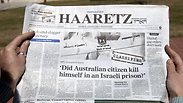
A lesson in communications and collegiality
Op-ed: When Channel 10 faced a shutdown, most Israeli journalists expressed their solidarity. This time, when Yedioth is in the middle of a crisis, some journalists are joining the attack on the newspaper. This is not their finest hour.
More than a decade ago, Haaretz-owned financial newspaper The Marker published an article about a Russian oligarch under the title “Money buys legitimacy.” The article focused on Leonid Nevzlin, who “marched into the heart of the Israeli consensus when he was elected as chairman of the International Board of Governors of Beit Hatfutsot (The Museum of the Jewish People). The business sector in Israel does not know how to receive the Russian Jewish oligarchs, as the source of their fortune is not very clear but their wealth is very tempting.”
A few years went by, Nevzlin was convicted of murder in Russia (the extradition request was rejected by the Supreme Court over inadmissible evidence), moved on and then acquired more legitimacy when he bought 20 percent of the shares of Haaretz newspaper at a price which, according to bigger experts than me, was somewhat exaggerated. To use the words of Sami Peretz, the writer of the abovementioned article who had gone on to become The Marker’s editor-in-chief, we had ourselves another example of “money buys legitimacy.” None of the acclaimed writers over there dared to write a word about the shady deal.
God is my witness that I have nothing good to say about what has been revealed over the past two weeks from the conversations between Prime Minister Benjamin Netanyahu and Yedioth publisher Arnon Mozes. On the contrary. I have already written three articles that not only included no whitewashing, but called on my publisher to suspend himself as the managing editor, and on Netanyahu to suspend himself from the position of communications minister. And no, it wasn’t easy for me, because Mozes personally gave me complete freedom.
I am not passing judgement on Nevzlin. Haaretz turned him into a problematic figure, and that same newspaper is now leading a vicious attack on Yedioth Ahronoth. Haaretz’s writers didn’t have a quarter of the courage and sincerity being demonstrated by Yedioth’s editors and writers these days, but they see themselves as braver and smarter than everyone else. Ever since he bought one-fifth of the newspaper’s shares, Nevzlin has been given full immunity. Why? Because that’s the way it is there. Pious hypocrites.
This isn’t just about semantics of ownership and interests. It’s about essence. Not only is there no diversity there, but that narrowminded newspaper took advantage of the crisis to lash out at Prof. Daniel Friedmann, who publishes critical articles about the legal system in Yedioth, while providing “proper disclosure” that Haaretz itself has adopted a line of “defending the rule of law and the need to strengthen the public’s trust in the institutions defending the rule of law.” That’s basically like presenting full disclosure and claiming that Pravda defends “the mechanisms of the rule of law.”
Protecting democracy and the rule of law requires a variety of opinions. But Haaretz has his own logic. It wants one stance. Just one. Just like its refusal to publish an article presenting the facts on the arrangement that was offered to the Bedouins in the Negev. Brainwashing wins, in the name of “protecting government mechanisms.” This newspaper, I must confess, succeeds in outdoing itself. It’s not journalism. It’s not democracy. It’s indoctrination.
It’s Haaretz’s right to employ journalists who share the exact same views. It’s Haaretz’s right to lead bolshevism. It’s Amnon Abramovich’s right to admire that newspaper, as he declared on Channel 2 News a week ago, despie it’s bolshevism and even though he himself writes for Yedioth. But they must not preach us.
Journalist Keren Neubach interviewed The Marker founder and Haaretz deputy publisher Guy Rolnik, and one might have gotten the impression that he was a model figure for ethics. Excuse me? The man who laid ruin to journalists’ organized work and made them more dependent on publishers? The man who held a dazzling The Marker convention, a tycoon-newspaper convention sponsored by business magnate Yitzhak Tshuva at the New York Plaza Hotel, is preaching us? After all, there have been repeated claims that The Marker’s coverage of Bank Hapoalim and Bank Leumi was not disconnected from the newspaper’s relationship with the banks. And while we’re on the issue of tycoons and newspapers—and we should discuss this issue—Rolnik should be on the examined side, not on the side of moral guides.
Neubach, might I remind everyone, kept working at the Israel Broadcasting Authority even when it was controlled by a problematic group. Like most IBA journalists, she didn’t sell her soul. But this week, I was asked about 10 times why I wasn’t resigning. IBA journalists kept quiet over the hostile takeover. Haaretz journalists kept silent when Nevzlin bought shares. No protests or resignations were recorded. But they are smarter than others.
The past two weeks have been a critical time for Yedioth Ahronoth. The newspaper got through it. It has also been a critical time for many journalists outside Yedioth. Notably, two of them, Ben Caspit and Nehemia Shtrasler, saw it fit to say a good word and offer encouragement for our journalistic work. It’s called collegiality, even solidarity.
But there are others, like Rolnik and Raviv Drucker. Drucker has an old score to settle with Yedioth over some article that was published about him, but his serious investigative reports from the past few years have received full and decent backing in the newspaper, and that was the right thing to do. When Channel 10 faced a shutdown, most Israeli journalists expressed their solidarity. But Drucker, like Rolnik and a large part of the Haaretz bunch, saw it fit to join the attack on Yedioth. This is not their finest hour.
Yedioth is not immune to criticism. What is being leaked from the Netanyahu-Mozes conversations is definitely troubling. More than troubling. And if the deal had been executed, “all of us, as one, would have left.” That’s what Ron Yaron, Yedioth’s editor-in-chief, wrote. Anyone familiar with those involved knows that is exactly what would have happened.
The current crisis, and there is a crisis, is an opportunity for self-examination and alterations. This may be the time to create a treaty of journalists, from all media outlets, to protect free press. I have turned to the Journalists’ Association and to the Journalists’ Organization and asked them to team up at least on one issue. The ball is in their court. Let’s hope they rise to the challenge.











